In
Past events 2023
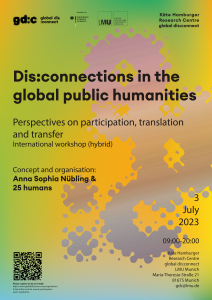 Interest in science communication and transfer is growing. This workshop attempts to negotiate challenges and opportunities in thinking through public humanities, including digital humanities, on a global scale.
Interest in science communication and transfer is growing. This workshop attempts to negotiate challenges and opportunities in thinking through public humanities, including digital humanities, on a global scale.
09:00-18:00: Workshop
In the first panel, we discuss what challenges the humanities currently face, interrogating what the humanities are and could be for from a global perspective. Such a perspective not only challenges the idea of the humanities as a European concept, but also forces us to think about what constitutes a public and/or community, and what the existence of various (global) publics and communities means for the idea of public humanities, its communication and transfer. The panel also addresses how we can develop a language capable of translating not only between different scholarly disciplines but also between different publics.
The second panel asks how the humanities relate to the omnicrises of the present. How do, can and should the humanities participate in identifying, naming, discussing, combatting or otherwise relating to these crises? How can the quality of the humanities infuse publics and with which tools?
The third panel addresses the challenges and possibilities of digital tools for the global public humanities. How can they help overcome, alleviate and negotiate the challenges of the global humanities? How do digital humanities help us connect more globally, and how does its required infrastructure hinder inclusivity?
The workshop closes with a panel on perspectives ‘from below’. As the workshop is co-organised by a network of junior scholars, whose aim is to strengthen the humanities’ perspective in society, we are especially interested in the role of junior scholars in practicing and representing global public humanities. How can their perspectives on the problems and potentials of the humanities be best integrated into a larger conversation, thereby accounting for the different positionalities of junior scholars in the global North and South? This panel also lets participants share their experiences of what practical challenges arise from the particular perspective of a career in the humanities and how they can overcome.
Speakers:
Eva-Maria Bergdolt (CAPAS Heidelberg), Canan Hastik (TU Darmstadt), Sarah Dillon (Cambridge University), Premesh Lalu (University of Western Cape), Martin Puchner (former fellow at Käte Hamburger Research Centre global dis:connect, LMU Munich; Harvard University), Gimena del Rio Riande (University of Buenos Aires), Lwando Scott (University of Western Cape), Inéz-Maria Wellner (VolkswagenStiftung/
25humans)
18:30-20:00 Conversation (open to the public): Thinking the global, thinking the public: Public humanities and the world
How do we think the public humanities globally - what is a global perspective on the public humanities? We share senses of what it means to do humanities but all practice humanities work under local conditions. What, if anything, translates between these contexts? Is there a sense in which the public humanities can be "global"?
We discuss these questions, and others related to the public humanities, with Roland Wenzlhuemer (global dis:connect), Sarah Dillon (Cambridge), and an open hot-seat for everybody to join us on stage.
Participants:
Sarah Dillon (Cambridge University), Roland Wenzlhuemer (Käte Hamburger Research Centre global dis:connect, LMU Munich), the audience (everyone is invited to join the conversation).
Chair:
Tim Lanzendörfer (Goethe University Frankfurt)
Organisers:
Anna Sophia Nübling (former postdoctoral researcher at Käte Hamburger Research Centre global dis:connect, LMU Munich) & 25humans
Venue:
Käte Hamburger Research Centre global dis:connect Maria-Theresia-Str. 21 81675 Munich
Please register by 28 June
HERE.
To download the programme click
HERE.
Continue Reading
 Interest in science communication and transfer is growing. This workshop attempts to negotiate challenges and opportunities in thinking through public humanities, including digital humanities, on a global scale.
Interest in science communication and transfer is growing. This workshop attempts to negotiate challenges and opportunities in thinking through public humanities, including digital humanities, on a global scale.





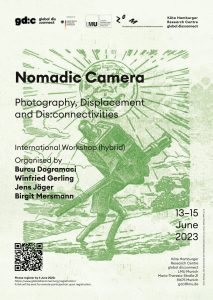 Processes of migration and flight after 2015 and their depiction, perception and distribution through photography are the starting point of ‘Nomadic Camera’. We seek to investigate the relationship of photography and contemporary migration in technology, the media and aesthetics in addition to historical exile and flight as the pivotal discursive setting in which specific forms of mobility extending from the mid-19th century to today have been negotiated. The concept adapts the term ‘nomadic’ — a transitory form of existence — beyond static concepts of being and national boundaries (Demos 2017). ‘Nomadism’ refers to a form of mobility that converges with and diverges from other terms, such as ‘travel’, ‘displacement’ and ‘exile’ (Kaplan 1996). At the same time, displacements are intrinsically related to connective and disconnective experiences, including place-making and belonging, ruptures between life and work in the past and present, experiences of loss and challenges of beginnings. ‘Nomadic Camera’ will centre around the following questions: how do dislocations interconnect with the technical evolution of photography as a mobile medium? How do camera technologies presuppose and affect the visual formulation of exile, migration and flight experiences? What modifications in aesthetics and style, methods and practices of photography do temporary mobility, geographical relocation and resettlement imply?
Processes of migration and flight after 2015 and their depiction, perception and distribution through photography are the starting point of ‘Nomadic Camera’. We seek to investigate the relationship of photography and contemporary migration in technology, the media and aesthetics in addition to historical exile and flight as the pivotal discursive setting in which specific forms of mobility extending from the mid-19th century to today have been negotiated. The concept adapts the term ‘nomadic’ — a transitory form of existence — beyond static concepts of being and national boundaries (Demos 2017). ‘Nomadism’ refers to a form of mobility that converges with and diverges from other terms, such as ‘travel’, ‘displacement’ and ‘exile’ (Kaplan 1996). At the same time, displacements are intrinsically related to connective and disconnective experiences, including place-making and belonging, ruptures between life and work in the past and present, experiences of loss and challenges of beginnings. ‘Nomadic Camera’ will centre around the following questions: how do dislocations interconnect with the technical evolution of photography as a mobile medium? How do camera technologies presuppose and affect the visual formulation of exile, migration and flight experiences? What modifications in aesthetics and style, methods and practices of photography do temporary mobility, geographical relocation and resettlement imply?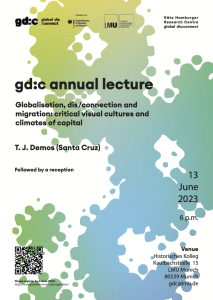
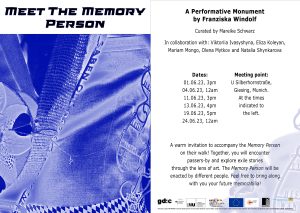 “Many artists from Munich went into exile, and many artists come into exile in Munich today. Become the “Memory Person” to interact with passers-by on the streets to collect and record memories and present experiences of exile and migration in Munich!”
Organisers: Franziska Windolf, Mareike Schwarz
Meeting point: U Silberhornstraße, Giesing, München
Dates:
“Many artists from Munich went into exile, and many artists come into exile in Munich today. Become the “Memory Person” to interact with passers-by on the streets to collect and record memories and present experiences of exile and migration in Munich!”
Organisers: Franziska Windolf, Mareike Schwarz
Meeting point: U Silberhornstraße, Giesing, München
Dates:
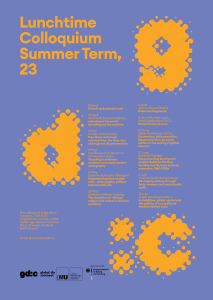 The lunchtime colloquium (“ltc”) of the gd:c continues in the summer term. The first session will take place on 25 April. The colloquium takes place on Tuesdays from 11.30 am to 1 pm at the library of the Research Centre.
The lunchtime colloquium (“ltc”) of the gd:c continues in the summer term. The first session will take place on 25 April. The colloquium takes place on Tuesdays from 11.30 am to 1 pm at the library of the Research Centre.
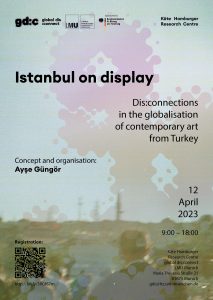 On 12 April 2023, the Centre will hold a workshop centring on the representation of Istanbul in Germany through several exhibitions since 2000.
On 12 April 2023, the Centre will hold a workshop centring on the representation of Istanbul in Germany through several exhibitions since 2000.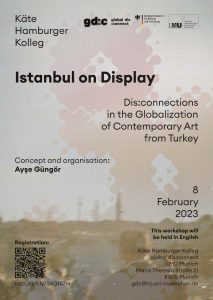 On 8 February 2023, the Centre will hold a workshop centring on the representation of Istanbul in Germany through several exhibitions since 2000.
The global curatorial and artistic narratives about artists from Turkey have resulted in several critiques of European representational strategies that are predominately centred on geographical, cultural and national identities. In consequence, an increasing number of critical artistic and curatorial practices have emerged that attempt to transcend and challenge the art world's reductionist, Eurocentric tendencies, such as casting doubt on conventional stereotypes of East vs. West and the construction of 'Other'.
With global connectedness and disconnectedness as framing concepts, this workshop aims to explore the tensions that emerge from this dichotomy and how they relate to representations of Istanbul through several exhibitions in Germany since 2000. By exploring this context as a complex relationship of global interconnectivity, it aims to identify gaps, limitations and tensions in the globalisation processes of contemporary art from Turkey by considering the politics of art and exhibition politics in Europe.
This workshop's main objective is to contribute to a decolonial discussion on the globalization of contemporary art from Turkey by focusing on exhibition strategies and artistic forms of resistance. This involves sharing knowledge to understand globalisation and its intricate structures from a variety of perspectives. The workshop is a forum for debate and dialogue, bringing together scholars, artists, and curators to further develop this research and share from their own areas of expertise.
Where and when: Munich, 8 February 2023, 9.00 - 18.30
Language: English
Venue: Käte Hamburger Research Centre global dis:connect,
On 8 February 2023, the Centre will hold a workshop centring on the representation of Istanbul in Germany through several exhibitions since 2000.
The global curatorial and artistic narratives about artists from Turkey have resulted in several critiques of European representational strategies that are predominately centred on geographical, cultural and national identities. In consequence, an increasing number of critical artistic and curatorial practices have emerged that attempt to transcend and challenge the art world's reductionist, Eurocentric tendencies, such as casting doubt on conventional stereotypes of East vs. West and the construction of 'Other'.
With global connectedness and disconnectedness as framing concepts, this workshop aims to explore the tensions that emerge from this dichotomy and how they relate to representations of Istanbul through several exhibitions in Germany since 2000. By exploring this context as a complex relationship of global interconnectivity, it aims to identify gaps, limitations and tensions in the globalisation processes of contemporary art from Turkey by considering the politics of art and exhibition politics in Europe.
This workshop's main objective is to contribute to a decolonial discussion on the globalization of contemporary art from Turkey by focusing on exhibition strategies and artistic forms of resistance. This involves sharing knowledge to understand globalisation and its intricate structures from a variety of perspectives. The workshop is a forum for debate and dialogue, bringing together scholars, artists, and curators to further develop this research and share from their own areas of expertise.
Where and when: Munich, 8 February 2023, 9.00 - 18.30
Language: English
Venue: Käte Hamburger Research Centre global dis:connect, 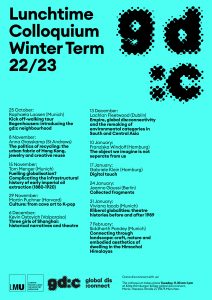 The lunchtime colloquium ("ltc") of the gd:c continues in the winter term. The first session will take place on 25 October. The colloquium takes place on Tuesdays from 11.30 am to 1 pm at the library of the Research Centre.
You can download the programme of the lunchtime colloquium
The lunchtime colloquium ("ltc") of the gd:c continues in the winter term. The first session will take place on 25 October. The colloquium takes place on Tuesdays from 11.30 am to 1 pm at the library of the Research Centre.
You can download the programme of the lunchtime colloquium